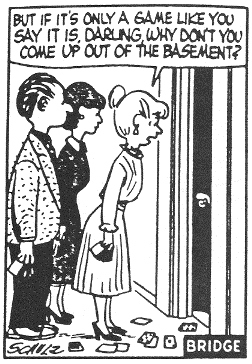Reading Eagle – 20 Jun 1935 by Ely Culbertson
It is not very kind to laugh at the misfortunes of others, and for this reason I hesitated before using today’s hand. But sometimes Bridge games produce examples of genuine humor, and the deal below is one of them. It was played in a casual game at Crockford’s Club, the famous New York Bridge Club. One of the, players held as nearly a perfect hand as most of us will ever see. He was first thrown off his course by an opening psychic bid, and in trying to recover he got his bidding tangled up and finally played at a part-score contract in his weakest suit, instead of at a Grand Slam contract in his best suit.
South. Dealer. East-West vulnerable.
Look at the West hand carefully; you may never see one like it. It was unfortunate for West that he was not the dealer; by making an opening two-bid (strong) and receiving a positive response from his partner he would probably have succeeded in reaching seven no trump. But West did not deal; and South, a famous woman player, sensed the hopeless nature of the North-South hands and made a psychic opening bid of one club.
West could have coped with this psychic attack by overcalling some forcing call. But West was confused by the array of Aces and Kings which faced him, and could not keep his wits about him. He bid only two spades. Since this bid, while strength-showing, is not forcing, it was very lucky for West that his partner kept the bidding open at all. But the luck was still holding up, and East bid three diamonds. North having passed. West now realized his first overcall had by no means shown his great power, and knew he should have bid the opponents’ suit. To repair this error, West decided to bid clubs. «Three clubs!» said he.
Alas, this could have made matters even worse; for, three diamonds having already been bid, three clubs was insufficient. But North could have rescued West from his predicament by calling attention to the irregularity; for West would then have corrected his error by bidding six or seven no-trump. North, however, was not so kindly disposed. He merely passed. East decided West had a fair hand with a strong club suit, and that the opponents probably had the major-suit strength, making game impossible. So East passed too. South, supremly happy that the opponents had not reached a game (though of course not dreaming of how great the danger really was) was satisfied to pass and let West play the hand in her best. And at three clubs. undoubled, the biggest hand ever dealt in Crockford’s was played.
Poor West! He did not even make his contract.
